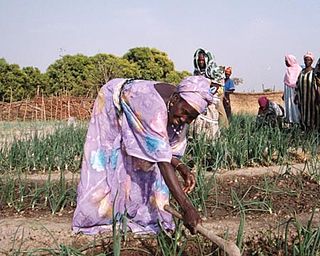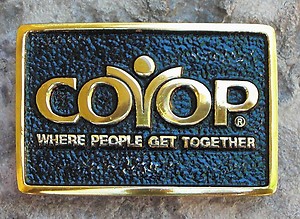Related Research Articles

Alice Louise Waters is an American chef, restaurateur, and author. In 1971, she opened Chez Panisse, a restaurant in Berkeley, California, famous for its role in creating the farm-to-table movement and for pioneering California cuisine.

An agricultural cooperative, also known as a farmers' co-op, is a producer cooperative in which farmers pool their resources in certain areas of activities.
The United Kingdom is home to a widespread and diverse co-operative movement, with over 7,000 registered co-operatives owned by 17 million individual members and which contribute £34bn a year to the British economy. Modern co-operation started with the Rochdale Pioneers' shop in the northern English town of Rochdale in 1844, though the history of co-operation in Britain can be traced back to before 1800. The British co-operative movement is most commonly associated with The Co-operative brand which has been adopted by several large consumers' co-operative societies; however, there are many thousands of registered co-operative businesses operating in the UK. Alongside these consumers' co-operatives, there exist many prominent agricultural co-operatives (621), co-operative housing providers (619), health and social care cooperatives (111), cooperative schools (834), retail co-operatives, co-operatively run community energy projects, football supporters' trusts, credit unions, and worker-owned businesses.

The Cheese Board Collective in Berkeley, California, comprises two worker-owned-and-operated businesses: a cheese shop/bakery commonly referred to as "The Cheese Board" and a pizzeria known as "Cheese Board Pizza". Along with Peet's Coffee, the Cheese Board is known for its role in starting the North Shattuck neighborhood of Berkeley on its way to becoming famous as a culinary destination: the "Gourmet Ghetto". The bakery brought the French baguette into vogue for Berkeley consumers, and helped spark a revolution in artisan bread.

Dublin Food Co-operative Society Limited is a consumer co-operative founded in 1983 and based in Kilmainham, Dublin, with a focus on organic and wholefood products. The Dublin Food Co-op is part of the worldwide co-operative movement.
The Wedge Community Co-op or The Wedge is a food cooperative located in Minneapolis, Minnesota. Located at 2105 Lyndale Avenue South, the Wedge derives its name from the popular nickname for the Lowry Hill East neighborhood, called "The Wedge" due to its shape. The Wedge is a member of the NCG.

The Gourmet Ghetto is a colloquial name for the business district of the North Berkeley neighborhood in the city of Berkeley, California, known as the birthplace of California cuisine. Other developments that can be traced to this neighborhood include specialty coffee, the farm-to-table and local food movements, the rise to popularity in the U.S. of chocolate truffles and baguettes, the popularization of the premium restaurant designed around an open kitchen, and the California pizza made with local produce. After coalescing in the mid-1970s as a culinary destination, the neighborhood received its "Gourmet Ghetto" nickname in the late 1970s from comedian Darryl Henriques. Early, founding influences were Peet's Coffee, Chez Panisse and the Cheese Board Collective. Alice Medrich began her chain of Cocolat chocolate stores there.
Federal Retail and Trading Services (FRTS) is the central buying group for co-operative retail societies in the United Kingdom. It came into its current structure in 2015, though its predecessor was established in 1993, and it supplies almost all food bought for sale by the over 4,000 co-operative foodstores in the UK. The buying group is owned and controlled by each of its member societies but is managed by The Co-operative Group on their behalf. It operates by pooling the collective £8.5bn buying power for 18 co-operative societies in the UK, allowing them to negotiate better prices from suppliers, so as to compete effectively with other UK supermarket chains.

The 4th Street Food Co-op is a food cooperative located in New York City. The 4th Street Food Co-op runs a retail store at 58 East 4th Street, selling natural foods and household products. The co-op is member-owned and -operated, but open to the public, and focuses on offering locally grown organic, and ethically produced products.

Unicorn Grocery is a co-operative grocery store located in Chorlton-cum-Hardy, Manchester, England. As a workers co-op, it is controlled democratically by its members/owners, who run the business with a flat management structure and with an equal rate of pay. Ethics form the foundations of the business, and Unicorn's Principles of Purpose are the framework within which the business operates.

Consumers' Cooperative of Berkeley, informally known as the Berkeley Co-op, or simply Co-op, was a consumers' cooperative based in Berkeley, California, which operated from 1939 to 1988, when it collapsed due to internal governance disputes and bankruptcy. During its height, it was the largest cooperative of its kind in North America, with over 100,000 members, and its collapse has provoked intense discussion over how food cooperatives should be operated.

The Berkeley Student Food Collective (BSFC) is a collectively-operated nonprofit grocery market founded by students of the University of California, Berkeley. The 650-square-foot storefront is located across the street from the university, on Bancroft Way.

Citizens Co-op was a food cooperative, or a community owned market located in Gainesville, Florida. It closed in 2016 due to financial issues.

Arizmendi Bakery is a bakery located in the San Francisco Bay Area of California in the United States. They have locations in San Francisco, Berkeley, Emeryville, San Rafael, and in Oakland. They are a worker-owned cooperative. In 2011, they were voted the best bakery in the east bay by the East Bay Express. The bakery makes pastries, pizza and bread. Arizmendi Bakery came out of the Cheese Board Collective, forming in 1997. It was named after Basque priest and labor organizer José María Arizmendiarrieta. Food reviewer Tamara Palmer, from SF Weekly, called their Auntie Mabel's Kookie Brittle the best cookie in San Francisco. They also make fruitcake, using local dried fruits from the Rainbow Grocery Cooperative. During December 2011, the San Francisco location sold 400 fruitcakes daily.

Mandela Partners, formerly Mandela MarketPlace, is a non-profit organization in Oakland, California, that works to aid low-income communities in improving access to food and healthcare resources.

The Friends of Perfection Commune is an American Utopian community in San Francisco, California. The commune was founded in 1967 on principles of a common treasury, group marriage, free anonymous art, gay liberation, and selfless service. They were originally called the Sutter/Scott Street commune, and commonly referred to as the Kaliflower commune, after their newsletter of the same name. Because the commune's publishing activities helped spread their philosophy, they became a significant influence on Bay Area culture. Many members of The Angels of Light, a free psychedelic drag theater group, originally lived in the Kaliflower commune. The name Kaliflower referenced the Hindu name for the last and most violent age of humankind, the Kali Yuga.
Quay Co-operative (Cork) Limited, trading as Quay Co-op, is a worker cooperative operating a number of organic, vegetarian wholefoods shops, coffee docks and a restaurant in Cork City and County Cork.
References
- 1 2 Rosen, Laurel; McGrane, Sally. The Revolution Will Not Be Catered: How Bay Area food collectives of the `60s set the stage for today's sophisticated tastes. San Francisco Chronicle. 8 March 2000.
- 1 2 3 4 Wickstrom, Lois (1974). The Food Conspiracy Cookbook. San Francisco: 101 Productions. ISBN 0-912238-45-3.
- ↑ Berkeley People's Office The Great Food Buying Conspiracy Mother Earth News. July 1970.
- ↑ Curl, John (2006). Memories of Drop City - The First Hippie Commune of the 1960s and the Summer of Love. iUniverse, Inc. ISBN 0-595-42343-4.
- ↑ "Food Conspiracy Co-op - About Us".
- ↑ Ziniu Chen "Food Conspiracy Co-op: innovating for 40 years" Arizona Daily Star, 18 February 2011. Retrieved 2011-05-31.